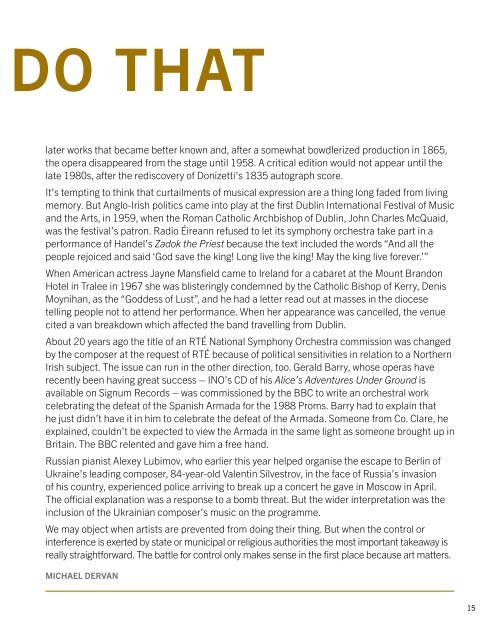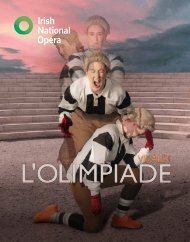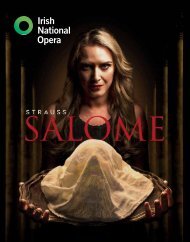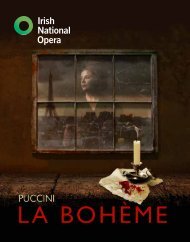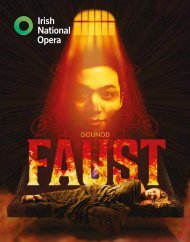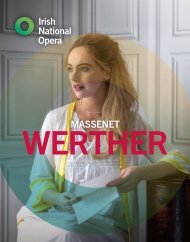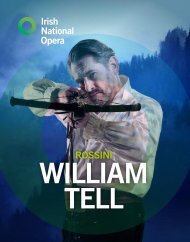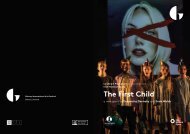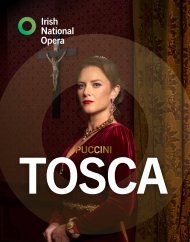Maria Stuarda Programme Book 2022
Irish National Opera
Irish National Opera
- No tags were found...
Create successful ePaper yourself
Turn your PDF publications into a flip-book with our unique Google optimized e-Paper software.
DO THAT<br />
later works that became better known and, after a somewhat bowdlerized production in 1865,<br />
the opera disappeared from the stage until 1958. A critical edition would not appear until the<br />
late 1980s, after the rediscovery of Donizetti’s 1835 autograph score.<br />
It’s tempting to think that curtailments of musical expression are a thing long faded from living<br />
memory. But Anglo-Irish politics came into play at the first Dublin International Festival of Music<br />
and the Arts, in 1959, when the Roman Catholic Archbishop of Dublin, John Charles McQuaid,<br />
was the festival’s patron. Radio Éireann refused to let its symphony orchestra take part in a<br />
performance of Handel’s Zadok the Priest because the text included the words “And all the<br />
people rejoiced and said ‘God save the king! Long live the king! May the king live forever.’”<br />
When American actress Jayne Mansfield came to Ireland for a cabaret at the Mount Brandon<br />
Hotel in Tralee in 1967 she was blisteringly condemned by the Catholic Bishop of Kerry, Denis<br />
Moynihan, as the “Goddess of Lust”, and he had a letter read out at masses in the diocese<br />
telling people not to attend her performance. When her appearance was cancelled, the venue<br />
cited a van breakdown which affected the band travelling from Dublin.<br />
About 20 years ago the title of an RTÉ National Symphony Orchestra commission was changed<br />
by the composer at the request of RTÉ because of political sensitivities in relation to a Northern<br />
Irish subject. The issue can run in the other direction, too. Gerald Barry, whose operas have<br />
recently been having great success – INO’s CD of his Alice’s Adventures Under Ground is<br />
available on Signum Records – was commissioned by the BBC to write an orchestral work<br />
celebrating the defeat of the Spanish Armada for the 1988 Proms. Barry had to explain that<br />
he just didn’t have it in him to celebrate the defeat of the Armada. Someone from Co. Clare, he<br />
explained, couldn’t be expected to view the Armada in the same light as someone brought up in<br />
Britain. The BBC relented and gave him a free hand.<br />
Russian pianist Alexey Lubimov, who earlier this year helped organise the escape to Berlin of<br />
Ukraine’s leading composer, 84-year-old Valentin Silvestrov, in the face of Russia’s invasion<br />
of his country, experienced police arriving to break up a concert he gave in Moscow in April.<br />
The official explanation was a response to a bomb threat. But the wider interpretation was the<br />
inclusion of the Ukrainian composer’s music on the programme.<br />
We may object when artists are prevented from doing their thing. But when the control or<br />
interference is exerted by state or municipal or religious authorities the most important takeaway is<br />
really straightforward. The battle for control only makes sense in the first place because art matters.<br />
MICHAEL DERVAN<br />
15


